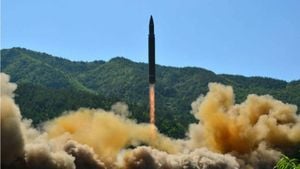With the United States presidential election just around the corner, the political atmosphere is electric. On November 5, Donald Trump faces off against Kamala Harris, and the stakes could not be higher—especially for countries like Bangladesh. Recently, Trump’s controversial tweet targeting violence against minority communities in Bangladesh has set off alarm bells within the country’s political circles, and for good reason.
On the festive occasion of Diwali, Trump condemned what he termed the “barbaric violence against Hindus, Christians, and other minorities” undergoing attacks and looting by mobs in Bangladesh. That tweet wasn’t just political rhetoric; it hinted at Trump’s possible priorities if he secures another term. While Democrats may dismiss his comments as mere attempts to sway voters, there's merit to examining the ripple effect they might have on U.S.-Bangladesh relations.
Predictive sentiment leans toward Trump securing victory over Harris based on the political climate. His tweet has taken the Bangladeshi ruling elite by surprise, stirring up worries about the future of U.S. foreign policy toward their nation. Trump claimed, "It would have never happened on my watch," asserting his commitment to protecting minority rights abroad. He also framed his administration as one committed to religious freedom, contrasting it sharply against Harris and President Biden, whom he accused of failing not just Hindus globally but of dropping the ball on foreign relations with key allies.
The undercurrents of this political tension arise amid growing critiques of the Harris administration. If Trump wins, the expectation is legitimate: he may use the democratic framework established by previous administrations to enact policies with serious repercussions for Bangladesh, ranging from sanctions to sharper foreign relations strategies. But here's where it gets more complicated—Trump’s administration could work to undermine Bangladeshi Nobel laureate Muhammad Yunus's influence, who has historically had ties to Democrats.
Yunus finds himself entangled not just with the turbulent political scene but with the broader geopolitical chess game at play. Following the recent upheaval and ouster of Prime Minister Sheikh Hasina—long backed by India—Bangladesh might have to brace for shifts depending on who wins the White House. With allegations of looming instability, the U.S. response could heavily influence the kind of governance and international investments Bangladesh might secure or be denied.
While Trump’s supporters proclaim his commitment to religious liberties, critiques label his intervention as more of a political ploy. Detractors argue it falls within broader Republican lobbying strategies, particularly the Hindutva faction which aims to bolster confrontation with Muslim-majority nations. Even pro-Democrat intellectuals suggest Trump's remarks will end up being wrapped up with political objectives rather than genuine humanitarian concern.
This narrative takes on additional layers when you examine Yunus's positioning within U.S.-Bangladesh relations. Previously, he had been vocal against Trump, labeling his victory as akin to experiencing the dark clouds of solar eclipses—sorely dismal and potentially destructive. His chorus of disapproval resonates with many progressive Democrats who see Yunus as the logical ally to navigate challenges from the Republicans tapping back more aggressively and mercilessly on the world stage.
Under Biden and Harris, Yunus had hoped for flourishing bilateral ties. Washington's stated policy has involved supporting and stabilizing the new Bangladeshi administration post-Hasina, pledging developmental aid and reforms aimed at addressing systemic corruption and improving governance. If Trump returns to power, this altogether changes the calculus, pushing Yunus to align interests hastily or risk falling out of favor.
The complications grow when strategizing alliances. Trump advocating for increased military presence or influence might favor more assertive policies toward Bangladesh, reflecting the Pentagon's preference for stability which often contradicts democratic aspirations. Should Trump's victory exclude Yunus of influence—there’s speculation he could align more with anti-Trump factions within local politics.
Now, if Kamala Harris rises victorious, the prospects appear brighter for Yunus and the Democrats, who can potentially craft Bangladesh’s political future with human rights at the center, leveraging their longstanding alliances with Yunus for progressive reform. A Harris administration could seek to cement U.S. interests through democratic initiatives rather than through military collaboration. Closer ties with India could also cultivate regional stability, especially with Harris being of Indian descent herself. This philosophy would run contrary to past Trump-led tendencies.
The gambit surrounding Bangladesh's standing with the U.S. is precarious, hinging on these political machinations. Yunus has experienced extensive recognition as more than just another political figure; he symbolizes democratic values, entrepreneurial efforts, and humanitarian advocacy. Yet, with turmoil breaching political landscapes, he faces two starkly different futures depending on the election outcome.
The on-going upheaval showcases Yunus’s precarious balancing act. Whether he pivots to gain support from newer regional allies or seeks decentralized power bases, Yunus's response will likely frame how Dhaka maneuvers within larger global interests. No matter the intent behind Trump’s tweets, they evoke fears of growing instability and geopolitical tug-of-war playing exactingly with Bangladesh’s path forward.
And therein lies the heart of the equation: Bangladesh’s future hinges on the upcoming election results, which promise to reshape not only its leadership but its international relationships. Whether it’s Trump who pursues aggressive policies threatening Yunus’s influence or Harris, who navigates progressive changes—Bangladesh stands firm at the crossroads of international diplomacy.
At the end of the day, the U.S. election and its subsequent fallout will be pivotal, and no outcome will be benign for Bangladesh. The harsh reality is the political lines are drawn, and whichever candidate leads will come with their own agenda, pushing Bangladesh to adapt swiftly to survive on the world stage.



